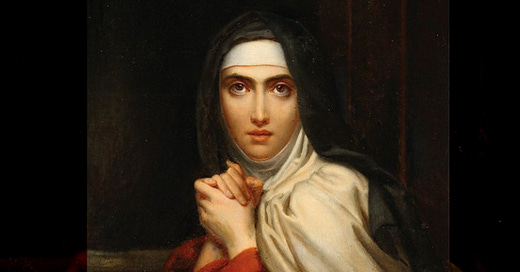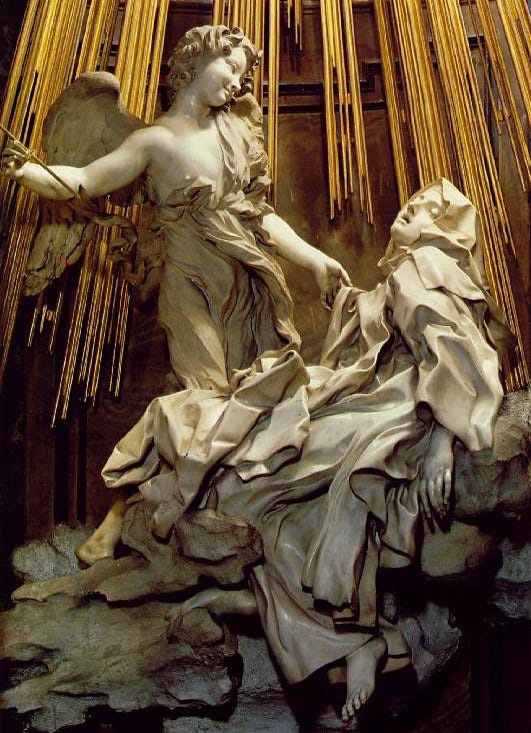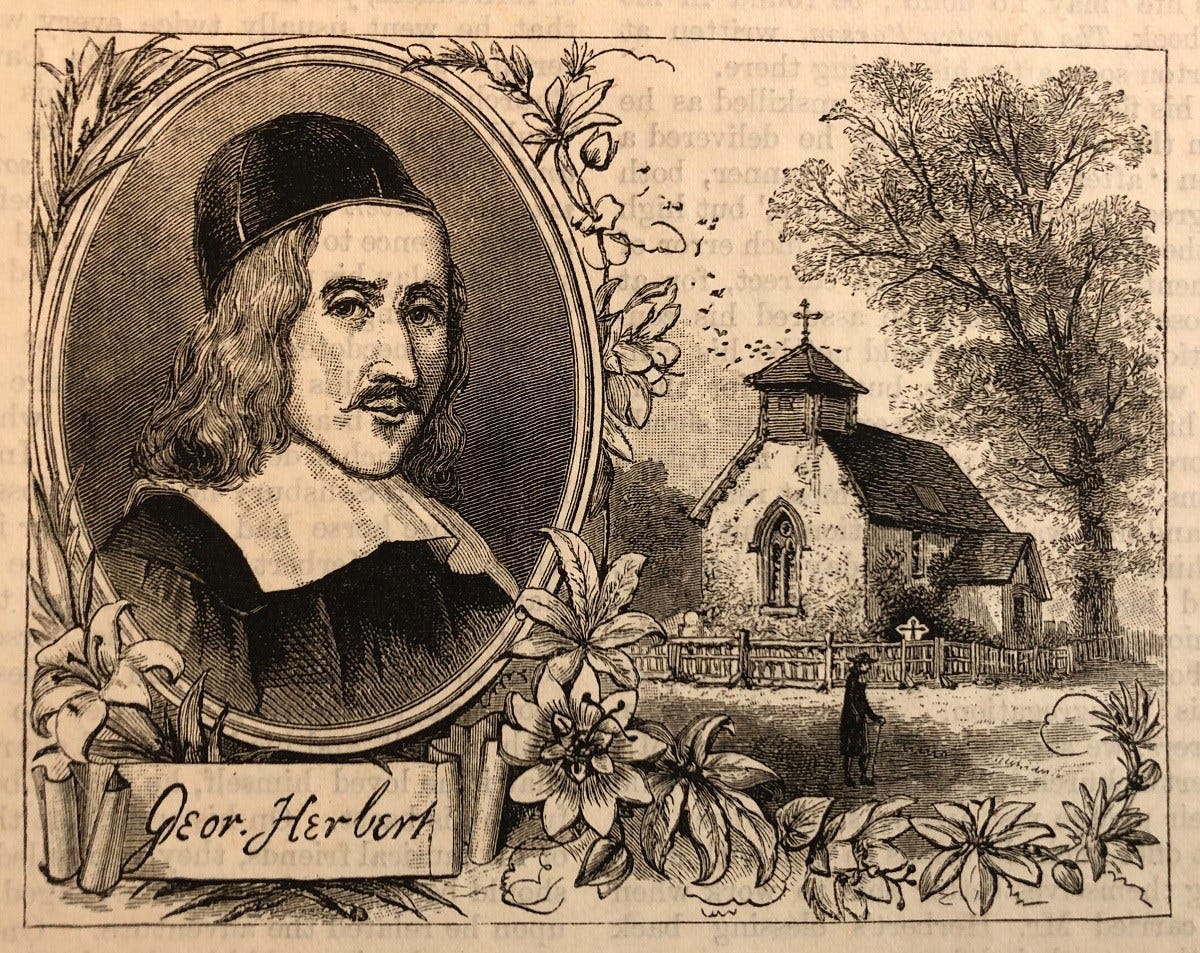COMMUNICATING WITH GOD – TWO POETS WHO SAW GOD WITH THEIR PENS
Smitten By Faith Issue Number : # 000092 14 September 2024
The summer is over and I am back at my writing desk.
Poets and poems never fail to move those of us who love the beauty and magic of words. But hold on, what if the poet is more than just a poet; what if the poet’s words were able to perfectly reflect the glory of God - leaving us breathless as we read ? Today’s essay features two such exceptional devotional poets for whom -clearly - God was their only subject. Two poets who were able to communicate their deep love for God; speak to God and bring God into their inspired writing.
Born a century apart in the 16th and 17th centuries, St. Teresa of Ávila, a Catholic nun and George Herbert, an Anglican priest were indeed able to see God with their pens and these two poets have left us with the precious legacy of their sacred poems which so aptly describe the depth of their love for God.
ST. TERESA OF ÁVILA OCD ( 1515 to 1582 )
St. Theresa of Ávila; oil on canvas (1827) by François Gérard
( From the public domain, Wikimedia Commons)
St. Teresa of Ávila, the Spanish mystic was a nun in the Carmelite Order (who also reformed it); one of the very few women Doctors of the Church and most of all, a poet who with her effortless God-given ability with language, was able to find the words worthy enough to declare and embrace the presence of God whom St. Teresa loved passionately and totally. So, what words could I possibly write to describe this awesome saint and poet ? I will let her own words do this. Here are some sacred poems by St. Teresa of Ávila. See for yourself how her words sweep and soar – higher; ever higher !
HAS THIS NOT HAPPENED TO YOU?
There are moments when I wish
I had a thousand lives to spend for God,
when no penance or suffering seems too severe.
And often when the opportunity occurs to act on these desires, they prove genuine.
But I cannot say that these desires stay with me,
for at times my soul turns coward
in the most trivial matters
and is too frightened
to undertake any work for God.
Has this not happened to you?
Sometimes I feel completely detached,
when I am in a moment of trial.
Yet the next day I discover
that I am quite attached to the very things
that I would have laughed at yesterday,
and I hardly recognize myself.
One day I am so full of courage
that I would do anything for God.
The next day I would not kill an ant
if I met the slightest opposition.
There are days when nothing anyone says disturbs me.
And yet there are also days
when a single word so devastates me
that I long to flee this world.
You, my God, know how it is.
Have pity on me.
Grant that I might accomplish
some of my dreams
for your greater honor and glory.
Spare me not completely.
For with your strength I can endure much;
without you I can do nothing.
LET NOTHING TROUBLE YOU
Let nothing trouble you.
Let nothing scare you.
All is fleeting.
God alone is unchanging.
Patience
everything obtains.
Who possesses God
nothing wants.
God alone suffices.
A 2009 photo of the Ecstasy of St. Teresa of Ávila by Bernini, located in Santa Maria della Vittoria, Rome. (Photo: Welleschik/Wikimedia Commons)
After St. Teresa died in 1582, her body remained un-decayed and incorruptible more than 450 years after her death, according to church officials who have unsealed her silver coffin. Canonized in 1622 and declared a Doctor of the Church in 1970, an honour to which only four women have been granted, Teresa was the fifth of 12 children who grew up in Spanish society. When her mother died, the young girl who loved reading romance novels perhaps needed some discipline; so her father sent her off to an Augustinian convent when she was just 15. Later Teresa entered the Carmelite Convent of the Incarnation in Ávila which at that time was not the strictly cloistered life of Carmelite nuns. In fact, Teresa had quite a liberal convent life with more freedom than she would have had at home.
Teresa’s ‘Road to Damascus’ moment came one day in 1555 at the convent when she saw an apparition of Christ being scourged at the pillar. This and other miraculous appearances with more encounters with God, changed her life forever. And St. Teresa began to write – voraciously – her pen and her mystical poems racing to convey how much she loved God ! Today, St. Teresa of Ávila’s writings are her indelible legacy to mankind. St. Teresa wrote a monumental work, ‘The Interior Castle’ but her short poems full of tranquillity, beauty and imagery are what connects us immediately with God. The pen of St. Teresa enabling the reader to quickly feel the love of God.
GEORGE HERBERT ( 1593-1633 )
Above :18th century engraving of George Herbert
My next poet who was also able to see God in his writing, is a wonderful English poet, orator and scholar, a pastor of the Church of England who lived in the 17th century. The poems of this very shy, retiring and unassuming man, George Herbert sing and dance – all the way to God. He was writing – ONLY to God so his devotional poems have a deep resonating sincerity and intensity. George Herbert literally saw God through his pen ! In his poem ‘Secretarie of Thy Praise’ below, you see how George Herbert refers to himself as ‘God’s Secretary’ ! He felt God and he knew God’s love for him which he ‘engraved in ( the ) steel’ of his words as you can read below in the extract from his poem ‘The Temple’.
George Herbert died young from consumption at the age of just 39 years but in his short life, he managed to write the most enduring poems; sacred poems; love poems - all directed to God. None of his poems were published in his lifetime but before he died, the humble George Herbert gave them to his friend, a publisher telling him to only publish the poems if he believed they might ‘turn to the advantage of any dejected poor soul.’ Today, his poems continue to be read by millions of Christians bringing light indeed to so many dejected poor souls, and the Anglican Church regards George Herbert as its greatest devotional poet.
Above : Illustration of George Herbert and St Andrew's Church in Bemerton, Wiltshire, where Herbert served as rector and in which he was buried.
As already mentioned earlier, for George Herbert, just as everything surely is entirely for God, his sacred poems were written entirely for God. There are so many poems which he wrote. I highlight here just some of my favourites. I hope that reading George Herbert’s beautiful and reverberating words will also kindle the fire in you; enable you to see and feel the wonders of our faith and the undeniable love of God.
EXTRACT FROM ‘THE TEMPLE ’
How should I praise thee, Lord !
How should my rhymes
gladly engrave thy love in steel.
EXTRACT FROM ‘SECRETARIE OF THY PRAISE’
O sacred Providence, who from end to end
strongly and sweetly modest ! Shall I write,
and not of thee, through whom my fingers bend
to hold my quill ? Shall they not do thee right ?
Of all the creatures both in sea and land
only to Man thou hast made known thy waves,
and put the pen along into his hand,
and made him Secretarie of thy praise.
EXTRACT FROM ‘LOVE (III )’
Love bade me welcome; yet my soul drew back,
guilty of dust and sin.
But quick-eyed Love, observing me grow slack
from my first entrance in,
drew nearer to me, sweetly questioning
if I lacked anything.
THE QUIDDITIE
My God, a verse is not a crown,
no point of honour, or gay suit,
no hawk, or banquet, or renown,
nor a good sword, nor yet a lute.
It cannot vault, or dance, or play;
it never was in France or Spain;
nor can it entertain the day
with my great stable or domain.
It is no office, art, or news,
nor the Exchange, or busy Hall;
but it is that which while I use
I am with thee, and Most take all.
The ‘Quidditie’ or The ‘Quiddity’ is a word derived from Latin which means the essence of something. In the poem above, George Herbert addresses the core of his Christian faith and asks what exactly is the essence of his faith. It is remarkably simple and yet tremendously powerful.
Indeed, for St. Teresa of Ávila and George Herbert, their world was indeed ‘charged with the grandeur of God’ ( these words by another great Catholic poet, Gerard Manley Hopkins ). For St. Teresa of Ávila, George Herbert, Gerard Manley Hopkins, St. John of the Cross and so many other mystical poets from time immemorial; poets who wrote – not mere secular verse – but sacred verse, their writing was very much a part of experiencing God and knowing God.
_________________________________________________________________________
Editor’s Note :
Dear Reader
Thank you for reading this edition of SMITTEN BY FAITH.
We publish at least once a month. ALL articles in every issue are FREE so you can simply click and subscribe as a FREE Subscriber to continuously receive the articles automatically by email.








Absolutely beautiful ! Thanks Joan for your beautiful writing & sharing always much appreciated. United in Christ with love, Wendy Siu